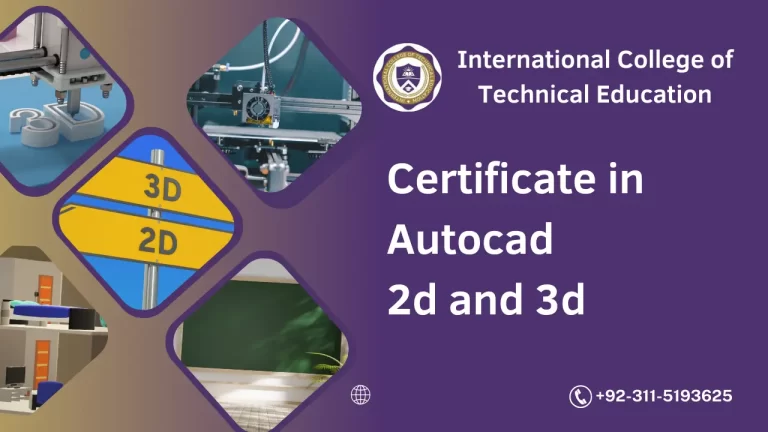The Civil Lab Technician Training Program is designed to equip individuals with the essential knowledge and skills required to work effectively in a laboratory setting within the civil engineering field. This comprehensive course covers various laboratory techniques, testing methodologies, and quality control procedures that are crucial for ensuring the safety, reliability, and performance of construction materials and structures. Participants will gain hands-on experience in conducting tests, analyzing results, and interpreting data, making them valuable assets in the construction industry.
Course Benefits:
Upon successful completion of the Civil Lab Technician Training Program, participants will enjoy a range of benefits, including:
Industry Relevance: Gain skills that are directly applicable to the construction industry, making graduates highly sought after by engineering and construction firms.
Hands-on Experience: Receive practical training in real-world laboratory settings, enabling you to apply theoretical knowledge to practical situations.
Career Opportunities: Open doors to various roles such as materials testing technician, quality control inspector, and laboratory analyst in construction companies, government agencies, and research institutions.
Contribution to Safety: Play a vital role in ensuring the safety and stability of construction projects by accurately testing construction materials and providing data-driven insights.
Professional Growth: Lay a strong foundation for further career advancement, including specialization in specific testing areas or pursuing higher education in civil engineering or related fields.
Course Learning Outcomes: Upon completing the Civil Lab Technician Training Program, participants will be able to:
- Understand fundamental concepts of civil engineering materials, testing procedures, and quality control protocols.
- Perform a wide range of tests on construction materials such as concrete, soil, aggregates, asphalt, and metals, adhering to industry standards.
- Analyze and interpret test results accurately, identifying potential material defects or discrepancies.
- Operate laboratory equipment and tools effectively, ensuring precision and safety during testing procedures.
- Apply mathematical and statistical techniques to analyze and present data obtained from various tests.
- Collaborate with engineers, architects, and construction professionals to provide essential data for project planning and execution.
- Maintain meticulous records of tests, observations, and outcomes in compliance with industry regulations.
Course Study Units:
The Civil Lab Technician Training Program is structured into comprehensive study units:
- Introduction to Construction Materials and Testing:
- Overview of construction materials (concrete, soil, aggregates, asphalt, metals)
- Importance of material testing in construction
- Introduction to testing standards and codes
- Laboratory Safety and Equipment:
- Safety protocols in the laboratory environment
- Familiarization with laboratory equipment and tools
- Proper handling and storage of testing samples
- Concrete Testing and Analysis:
- Concrete mix design and proportioning
- Compression, flexural, and slump tests for concrete
- Assessment of concrete strength and durability
- Soil and Aggregates Testing:
- Classification and properties of soil
- Sieve analysis, hydrometer analysis, and Atterberg limits tests
- Aggregate properties and gradation analysis
- Asphalt Testing:
- Asphalt mixture components and types
- Tests for asphalt density, stability, and flow
- Evaluation of asphalt performance and aging
- Metals and Non-Destructive Testing:
- Properties of metals used in construction
- Tensile, compressive, and shear testing of metals
- Introduction to non-destructive testing methods
- Quality Control and Data Interpretation:
- Statistical analysis of test results
- Quality control procedures and corrective actions
- Reporting and documentation of test findings
Entry Requirements: Prospective participants should meet the following entry requirements:
- High school diploma or equivalent qualification.
- Basic understanding of mathematics and physics.
- Proficiency in written and spoken English.
- Strong attention to detail and a commitment to precision.
- Interest in civil engineering, construction, and materials testing.
Future Progressions: Upon completing the Civil Lab Technician Training Program, graduates can pursue several paths for future progression:
Workforce Entry: Start a career as a civil lab technician in construction companies, quality control departments, government agencies, or research institutions.
Specialization: Choose to specialize in a specific area of materials testing, such as concrete technology, geotechnical engineering, or non-destructive testing.
Continuing Education: Pursue further education by enrolling in advanced courses related to civil engineering, materials science, or construction management.
Certification: Obtain relevant certifications from professional bodies or organizations, enhancing your credibility and career prospects.
Higher Education: Use the knowledge gained as a foundation for pursuing a bachelor’s degree in civil engineering or a related field, which can lead to higher-level positions and increased responsibilities.
Conclusion:
the Civil Lab Technician Training Program offers a comprehensive curriculum that blends theoretical knowledge with practical skills, preparing participants for a rewarding career in the construction industry. By meeting industry demands for accurate materials testing and quality control, graduates of this program will play a critical role in shaping the safety and integrity of construction projects. This course not only provides valuable skills but also opens doors to a range of career opportunities and possibilities for advancement within the dynamic field of civil engineering.






